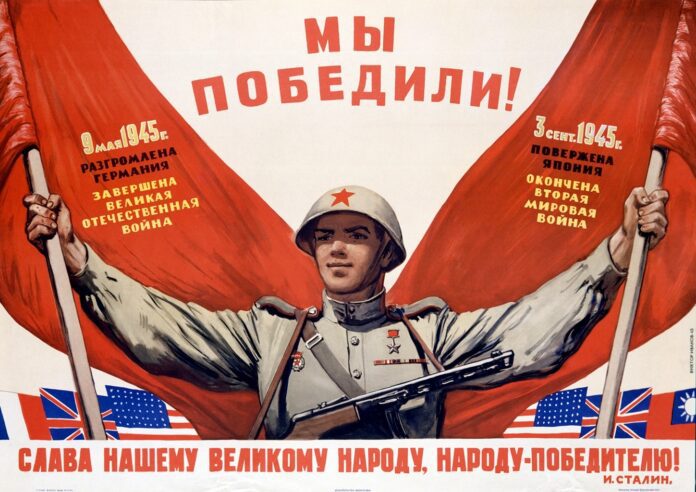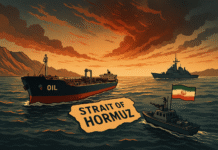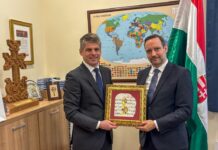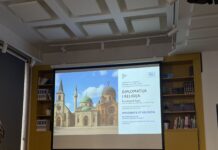The memory of World War II—or the Great Patriotic War, as Russia calls it—occupies a cult-like status in Russian popular and political culture. At home, the Russian government has co-opted and instrumentalized the powerful memory of Soviet heroism and victimhood to legitimize its rule.
In this version of the past, there is rightful pride in the valor and victory of the Soviet army but little mention of long-established truths, such as the Molotov-Ribbentrop Pact, mass rapes, and the disastrous retreat of 1941. The Russian state’s narrative downplays the terror of the Stalin years; dismisses the Holodomor famine, which killed millions of Ukrainians; and denies its repression of Eastern Europe and Central Asia. The suffering of ordinary people under communism is absent, pushed out by an ever-growing nostalgia for the Soviet Union’s great-power status.
But what happens in Russia does not stay in Russia. Abroad, the Russian Ministry of Foreign Affairs and other state bodies have actively used what I call “memory diplomacy” to bolster Russian influence and propagate this selective view of the Soviet past.
Memory diplomacy is a form of public diplomacy in which states or political groups try to improve relations and reputations by exporting commemorative practices and historical narratives and by allying their own historical narratives with those of another country. Unlike memory wars, which focus on criticizing alternative views of history, memory diplomacy is more about promoting Russia’s view, about creating memory allies rather than enemies.
Left: An eternal flame burns in front of a World War II monument depicting Soviet soldiers at a military historical museum in the village of Lenino, outside Moscow, on Feb. 15, 2020. DIMITAR DILKOFF/AFP via Getty Images Right: People with portraits of Soviet leader Joseph Stalin gather outside his museum in his native town of Gori, near Tbilisi, Georgia, on March 5, 2017, on the 64th anniversary of Stalin’s death. VANO SHLAMOV/AFP via Getty Images
Of course, memory diplomacy is not a Russian invention, but it is a tool the Kremlin has made its own. The sheer breadth of tactics the Russian state has deployed as part of this exercise is worth examining. In recent years, it has developed a wide array of commemorative symbols, activities, and core historical narratives for international use—spanning military history tours across Europe, commemorative dance competitions, and museum exhibitions on how the “Soviet soldier” saved the world.
The Russian Ministry of Foreign Affairs, embassies, cultural centers, and government-organized groups working on memory, such as the Russian Military Historical Society, organize and energetically export these activities around the world. Prior to 2015, Russian memory diplomacy efforts largely focused on the Russian diaspora and the former Soviet Union, but partly in an effort to develop Russian soft power, attention has since been shifted to foreign citizens without common historical or cultural links to Russia.
Perhaps Russia’s most famous memory export is the St. George’s ribbon, worn by Russians on Victory Day to commemorate World War II. Since 2009, Russian Embassies around the world have organized so-called “Volunteers of Victory,” largely comprising the Russian diaspora, to hand out St. George’s ribbons and historical marketing materials to passersby. In 2019, Volunteers of Victory were active in more than 90 countries, including the United States, where they distributed some 15,000 ribbons alongside brochures telling the (selective) history of both this symbol and the Soviet role in World War II. Embassy staff have, at times, targeted groups perceived to be sympathetic; in 2019, members of the left-wing Momentum group within the British Labour Party were photographed wearing the ribbons and even tweeted images depicting the ribbons draped around a gun.
But the Volunteers of Victory fail to mention the St. George’s ribbon’s other connotations, particularly those linked to the conflict in Ukraine. In 2014, eastern Ukrainian “self-defense” units gathered, bedecked in St. George’s ribbons and buoyed by Russian propaganda, to defend Soviet war memorials from so-called Banderivtsy (wartime Nazi collaborators). In 2014 and 2015, across Russia and Ukraine, people wore the ribbon to mark their support for Russia’s aggression in eastern Ukraine. In this way, the ribbon became a symbol of two wars but also evidence of how the Kremlin uses the memory of World War II, at home and abroad, as a Trojan horse to smuggle in other, more contentious, geopolitical stances.
An armed militiaman from the Donetsk People’s Republic’s self-defense forces puts a St. George’s ribbon, traditionally a symbol of anti-fascist struggle, on his assault rifle during the Victory celebrations in Donetsk, eastern Ukraine, on May 9, 2014.Janos Chiala/NurPhoto/Corbis via Getty Images
The Immortal Regiment procession, now present in 115 countries, is another successful memory export from Russian Victory Day celebrations. The procession involves people marching in groups, carrying portraits of relatives who contributed to the war effort. Originally a grassroots movement, the Moscow government staged a hostile takeover of the Immortal Regiment in 2015. Previously, foreign branches of the Immortal Regiment developed organically, but since then, relevant Russian Embassies have asserted control. Although most participants abroad come from the Russian diaspora, the Immortal Regiment is very popular in countries like Israel and Serbia, where it has become an integral part of Serbian World War II commemorations.
This may seem relatively innocuous, but those countries that accept and implement Russian commemorative traditions not only adapt to the Russian way of remembering, but they also incorporate aspects of the Russian official narrative of the war—a narrative that abounds in geopolitical symbolism. Russian state actors use a selective history of World War II as a tool to remind the world of Russia’s inherited right to the great-power status earned by the Soviet Union in 1945. The need to celebrate and restore the post-Yalta Conference order decided in 1945 is a frequent refrain when Putin addresses international audiences, whether at the United Nations in 2015 or in his National Interest article in 2020.
It is within this narrative that the historical and the geopolitical are most clearly intertwined. By promoting its view of World War II—one in which the Soviet Union did not occupy but liberated Eastern Europe, one in which the West left the Russians to bleed dry, one in which only non-Russian people collaborated with the Nazis—the Kremlin also promotes its vision of how the world ought to look. When Putin praises the post-Yalta Conference settlement, he is extolling a world that stands in contrast to the unipolar U.S.-led system that came after 1991.
In the post-Yalta Conference settlement, Moscow was a great power that had to be consulted over major world decisions. There was a Soviet sphere of interest in which other powers should not interfere, and smaller countries’ rights or even existence could be sacrificed for the security of the Soviet state. Russia, perhaps understandably, would like to see that world order restored—and that’s why other countries should pay closer attention to how the Kremlin uses history as a tool in domestic and foreign policy alike.
Left: William Bannerman from Glasgow, Scotland, and Jock Dempster from Dunbar, Scotland—World War II Russian Arctic Convoy veterans—display their commemorative medals after they were honored by the Russian Federation in Edinburgh, United Kingdom, on April 23, 2010. David Cheskin/PA Images via Getty Images Right: Russian President Vladimir Putin and Chinese President Xi Jinping attend a military parade to mark Victory Day in Moscow on May 9, 2015. RIA Novosti handout photo via Getty Images
According to the Kremlin’s logic, to deny this worldview is to deny Soviet sacrifices. But honoring the Soviet dead does not require questioning the statehood of Ukraine or denying the forced deportations of the Baltic people. The history the Kremlin promotes cannot be endorsed because it is so selective as to be untrue and even disrespectful to the memory of those who fought in World War II. In any case, the Russian state is not trying to promote historical investigations but to promote a flawed view of the world. To fail to recognize these distortions and conflations is to risk accepting not only a biased history but also a view of the world that is inherently unfair to those countries and people (Russians included) who have suffered under the Soviet and Russian states.
To distract from this, the Kremlin has become increasingly sophisticated at adapting its narratives to local tastes, making them easier to swallow: If in France, the Russian Foreign Ministry promotes its historical truth by emphasizing the Normandie-Niémen fighter pilots, then in the United Kingdom, it celebrates the Arctic Convoy veterans who brought supplies to blockaded Murmansk, Soviet Union.
In 2015, the Russian Foreign Ministry organized a trip for U.K. veterans to occupied Crimea, in which the veterans praised Russia’s hospitality, comparing it negatively with the U.K.’s treatment of veterans. Although the trip was covered in the U.K. and Russian press, this Potemkin visit did not mention conditions for veterans in Russia, many of whom live in poverty even as the memory of their exploits is used for political gain.
Memory diplomacy is not reserved for Western nations. Russian Foreign Minister Sergey Lavrov has made a point of raising Soviet contributions to China’s wartime efforts against Japan—and with some success. Last year, the Chinese and Russian ambassadors to the United States wrote a joint article for the U.S.-based security site Defense One, titled “Honor World War II with a Better, Shared Future.” In it, they argued the strength of China and Russia’s current alliance was grounded in their shared feats in World War II, but that victory was at risk from historical revisionists. Engaging in some revisionism themselves, the authors did not mention the Molotov-Ribbentrop Pact or former Chinese leader Chiang Kai-shek’s forces. Although it would not win any scholarly awards, the article did serve the purpose of showing China is a memory ally of Russia and encouraging at least some Americans to also see Russia as a memory ally.
Of course, while it’s a powerful cultural memory in many countries, Russian actors’ political uses of World War II are not appropriate in other places. In Germany, for example, where the war is obviously not a source of pride, Russian state-funded, German-language media, including RT and Sputnik, have sought to strike up memory alliances by appealing to a sense of Ostalgie, promoting a revisionist narrative that depicts the East German state in rosy hues. Russian media plays on the disappointments and trials following reunification and fuels a sense of nostalgia for a lost way of life and a time of close relations with the Soviet Union and Russian people.
A 1945 Soviet World War II poster by artist V. Ivanov depicts a soldier holding a large red flag in each hand, proclaiming “We Won!” Laski Diffusion/Getty Images
Meanwhile, in Africa, Russia has instead used the memory of decolonization to bolster its reputation. In 2018, Lavrov traveled to Luanda to unveil a monument, partly funded by the Russian Embassy, to the Soviet, Cuban, and Namibian fighters who took up arms for Angolan independence. In 2020, the Russian Ministry of Foreign Affairs also organized conferences on the topic of Soviet support for decolonization. Many Africans may feel grateful to the Soviet Union for its role in decolonization, showing that, like so many Russian activities, memory diplomacy exists within a gray zone, stretching from legitimate soft power to sub-threshold warfare.
By promoting pro-Russian historical narratives in certain countries, Russian-aligned actors can add to existing divisions there or undermine rivals. Although memory diplomacy can include positive acts of public diplomacy, it exists in a symbiotic relationship with Russia’s more sinister uses of history, including memory wars over historiographical issues. Russian politicians have been explicit about this connection, arguing its memory alliances—with Serbia, China, and Belarus to name just a few—constitute a front in what Russia sees as an ongoing war on historical memory.
This war has been portrayed as an existential struggle in Russia’s National Security Strategy, which argues that other countries are trying to achieve their geopolitical aims through the manipulation of social consciousness and historical falsification. History is depicted as the core basis of Russian unity and identity. An attack on Russia’s view of history is therefore an attack on Russia, its people, and its culture.
This conception of historical truth relates to a more comprehensive Russian vision of the world, where the United States, European Union, and its East European allies are waging a war on history and on truth itself. They are seeking to undo the results of World War II to undermine Russia and enforce a unilateral U.S.-led system on the world. Russia presents itself as the last bastion against this onslaught to defend historical truth and values of sovereignty, authenticity, and tradition around the world.
By creating the sense that Russian historical narratives and ways of remembering are increasingly present and popular in scores of countries, Russian politicians and officials can show domestic audiences they have attracted allies to their “war against historical falsification” and Russia is restoring historical truth worldwide. In 2020, the duty of the state to defend “historical truth” was even enshrined in the Russian Federation’s new constitution.
The tone is one of high messianism—but a preacher needs converts to justify his cause.
It is difficult to assess exactly how successful Russian memory diplomacy has been at converting its targets; although there has been obvious success in exporting Russian commemorative traditions and activities, in most countries, the participants comprise compatriots or people who were already sympathetic.
But culture and history wars are raging in many countries, creating fertile ground for future Russian efforts. In many ways, the ability of other countries to withstand Russian efforts to promote an archaic revisionist view of the world through flawed historical narratives will depend on whether those countries can resist using history as a vehicle for politics themselves.
By Jade McGlynn https://foreignpolicy.com/2021/06/25/russia-puting-ww2-soviet-ussr-memory-diplomacy-history-narrative/



















